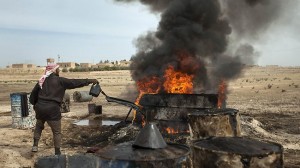With the looming tension regarding military strikes against Syrian forces by joint United States of American and British forces, its consequences have triggered concerns and speculations, stoking the price of crude oil.
West Texas Intermediate crude rose to the highest level in 18 months on speculation that tension in Syria will disrupt Middle East supplies.
But prices gained 2.9 percent as Foreign Minister Walid al-Muallem said that Syria’s defenses will “surprise” the world should the U.S. and its allies attempt military strikes.
Western powers told the Syrian opposition to expect a strike against President Bashar al-Assad’s forces within days, Reuters reported, citing sources that attended the meeting.
WTI for October delivery climbed $3.09 to $109.01 a barrel on the New York Mercantile Exchange. It was the highest settlement since Feb. 24, 2012, and the largest percentage gain since May 2. Trading was 20 percent above the 100-day average for the time of day at 2:38 p.m.
Prices were little changed after the American Petroleum Institute reported U.S. crude inventories increased 2.47 million barrels last week.
The October contract increased $2.97, or 2.8 percent, to $108.89 a barrel in electronic trading at 4:36 p.m. It traded at $108.91 before the report was released at 4:30 p.m.
Brent for October settlement increased $3.63, or 3.3 percent, to $114.36 on the ICE Futures Europe exchange, a six-month high. Volume was 58 percent above the 100-day average. The European benchmark’s premium to WTI widened to $5.35 from $4.81.
“The geopolitical tension in Syria certainly escalated one notch higher and it’s a significant notch,” said Harry Tchilinguirian, BNP Paribas SA’s London-based head of commodity markets strategy.
“It’s the implication of what a broader conflict in Syria would mean to key suppliers in that region. The market simply positioned itself long and waited for the next turn of events,” he added.
Syria is “hearing the drums of war all around us,” al-Muallem said at a televised news conference in Damascus. The government hasn’t obstructed the United Nations probe into its alleged use of chemical weapons, he said, adding that the U.S. may be carrying out psychological warfare.
U.S. Secretary of State, John Kerry, had said that President Barack Obama will hold Syria accountable for the “indiscriminate slaughter” of its own people with chemical weapons.
The evidence is “undeniable” that chemical weapons were used against residents of a Damascus suburb last week and that President Bashar al-Assad’s regime has the toxic weapons and the ability to deploy them, he said.
“It’s not the question of if they are going to intervene, but just when and how,” said Julius Walker, global energy markets strategist at UBS Securities LLC in New York. “The issue is whether such intervention will pull in neighboring countries.”
Syria borders Iraq and is near Iran, countries that together hold almost a fifth of the output capacity from the Organization of Petroleum Exporting Countries, according to Bloomberg estimates.
Syria itself produced just 164,000 barrels a day of the 28.3 million pumped in the Middle East last year, according to BP Plc (BP/)’s Statistical Review of World Energy.











